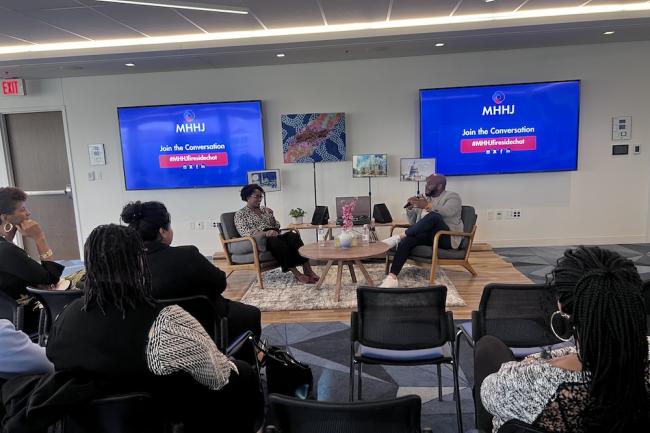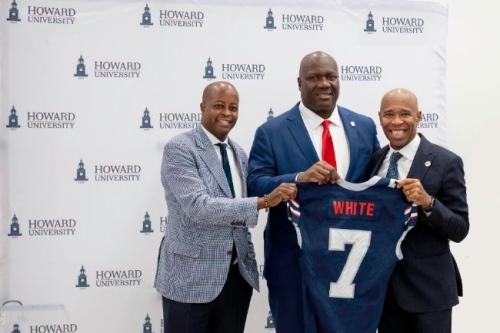WASHINGTON – On March 26, the Georgetown-Howard Center for Medical Humanities and Health Justice hosted their first public event, a fireside chat centered around health narratives in the Black community with Gene Demby, co-host of NPR’s Code Switch podcast, and Marcia Chatelain, Pulitzer Prize winning historian.
Co-executive directors Dana A. Williams, Ph.D., dean of the Howard University Graduate School, and Lakshmi Krishnan, M.D., Ph.D., founding director of the Georgetown Medical Humanities Initiative, founded the center based on a shared interest in how the humanities can improve healthcare training, delivery, and practice in ways that enact justice. This year’s theme – lore – explores how the histories, identities, and traditions of communities of color impact their views on medical care.
Chatelain and Demby shared perspectives on how they approach storytelling, noting that the lore, or the knowledge and traditions passed down among a culture, that impacts health comes from a range of places. One example focused on how advertising campaigns, particularly those of McDonald’s and popular brands of menthol cigarettes, have enabled corporations to become deeply entrenched in Black communities.
Chatelain's Pulitzer Prize winning book, “Franchise: The Golden Arches in Black America,” explores this idea through research and conversation. The “Calvin Got a Job” campaign that ran throughout the 1990s followed a Black Brooklyn teenager who went from hanging out on the street corner to being employed at the neighborhood McDonald's. His storyline unfurled throughout the decade, following him from the drive-thru window to management and eventually to the promise of owning a franchise.
“When you look at the majority of advertising toward African Americans for McDonald’s in a lot of the legacy publications they don't talk about the food. They talk about the fact that McDonald’s has made millionaires and how it’s one of the greatest employers of Black youth, and this is where it starts to become a health crisis,” said Chatelain.
“If you think about the interventions around nutrition and diet, your doctor might tell you to stop eating McDonald’s, but if it wasn't for McDonald’s, your child wouldn’t get a sports team, or there wouldn't be an art exhibit in your neighborhood, or you wouldn't have jobs for the kids that you’re concerned about in your neighborhood,” Chatelain continued. “Unpacking the complexity of that kind of thing is the hard work of telling a story. Stories have layers, many of which are filled with lore.”
“Building trust with certain communities can be difficult because it involves interrupting the trust that those people have built with sources that have misinformed them,” said Demby.
The pair discussed how advertising to the Black community has consistently been heavily researched and targeted by corporations and other entities. Millions of dollars are invested in determining what Black people will respond to and how to take advantage of their ideas of masculinity, status, etc. Demby highlighted the importance of storytelling in building an audience, as viewers are more attracted to stories than they are to plain facts.
“It is exciting to see a collaboration between Georgetown and Howard. As a medical student, I thought the conversation today touched on some very interesting ideas, particularly the importance of understanding how race and class have deeply influenced people's perspectives on health,” said Noah Nelson, Howard University medical student from Chicago, Illinois.
“They mentioned the MOVE bombings in Philadelphia and 1995 Chicago heat wave as health crises that changed the relationships between Black communities and governmental institutions. As a medical practitioner, it is important to take a holistic view of people’s health decisions to consider how their lived experiences inform those decisions.
###
About Howard University
Founded in 1867, Howard University is a private, research university comprising 14 schools and colleges. Students pursue more than 140 programs of study leading to undergraduate, graduate, and professional degrees. The University operates with a commitment to Excellence in Truth and Service and has produced three Schwarzman Scholars, four Marshall Scholars, four Rhodes Scholars, 12 Truman Scholars, 25 Pickering Fellows and more than 165 Fulbright recipients. Howard also produces more on-campus African American Ph.D. recipients than any other university in the United States. For more information on Howard University, visit www.howard.edu.





